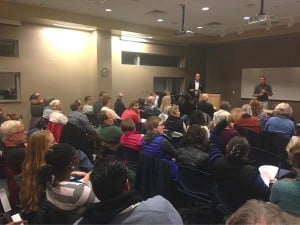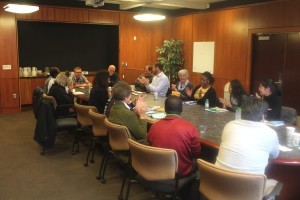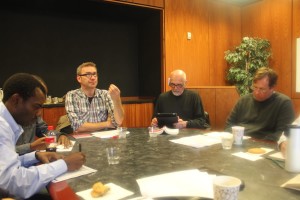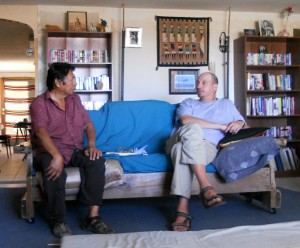After her husband disappeared, Estelle Thornton was doubly determined to do right by their seven children. Now her firstborn wants America to do right by all its sons and daughters.

Photo: Quantrell Colbert
He is tall, well over six feet, powerfully built, at ease in both pinstripes and army fatigues. His smile draws humans like stadium lights draw bugs. And he is the face of the National Parent Teachers Association.
Anna King will never forget the first time she met Otha Thornton ’01.
“It was 2008, my first National PTA convention,” she recalls. King was by herself in a place she’d never been, surrounded by people she didn’t know who all seemed to be each other’s best friends. Then out of the blue, Thornton walked up. “He said, ‘You look lost.’ I told him I didn’t know what I was supposed to do, and he showed me around,” King says. “He asked me if anyone had spoken to me, and I said no. Then he looked right at me and said something I have never forgotten: ‘If they don’t speak to you, you speak to them. We are all in this together.'”
Six years later, King is a National PTA board member, and Thornton is president of the four-million-member, century-old association. He made national headlines—and Ebony magazine’s Power 100 list—a year ago when he became the first African American man to head an organization emerging from its white, female, suburban chrysalis. And if Thornton has a mantra, it may be the one he shared with Anna King: “We are all in this together.”
That attitude—that each person is somehow his special guest at a really great party—is hard to resist. “He’s captivating,” says Heidi May, National PTA’s media relations manager. “People get very excited to be in his presence. We have to have someone walking with him to make sure he gets from one point to the other.”
It’s the first day of the 2014 National PTA Convention in Austin, and the job of keeping Thornton on schedule falls to PTA Executive Director Joanne Dunne. He is making his way through the cavernous exhibit area in a flawless blue suit, blue shirt, and yellow tie, cutting a wide, button-down swath through a roomful of business casual. Every few yards, someone catches his eye; he stops, powers up his megawatt smile, shares a big hug, poses for a selfie, and settles down for a nice chat.
Dunne peers down an aisle lined by about twenty booths, each featuring services and products for kids and educators, and sighs. How long will Thornton have to introduce himself to these exhibitors, learn about their wares, maybe build some relationships, before he has to get to the next item on his agenda? “We have fifteen minutes to get through here, and I’m not sure we can do it,” she says as another fan pulls him aside. “In the PTA, Otha is Brad Pitt.”
This is the last place Thornton expected to find himself.
Childhood Interrupted
Thornton grew up in Georgia, in a working class family, and when he was thirteen, his father abandoned them. “He just left my mom with seven kids, including a six-month-old, a two-year-old, and a four-year-old,” he says.
As the oldest, Thornton did his best to help support the family. He worked in restaurants, supermarkets, and in the woods, stacking cut timber and loading it on trucks. They received some public assistance, and neighbors would bring garden vegetables, but it was a meager, uncertain existence.
“I was a skinny kid,” Thornton remembers. “Although our mother did her very best, it was a challenge feeding and caring for seven children. When school was out, we worried, because we knew were not going to get that meal.”
Estelle Thornton, however, was not the type to let hard times beat her children down. She insisted that they study and succeed in school, and Thornton listened. He enrolled in nearby Morehouse College and dreamed of becoming a city planner. Then, when he was a junior, he learned his father was in town. “I drove about ten miles up the road, and we sat down for a couple hours,” he remembers. “I said, ‘How could you leave a woman with seven kids?”
They talked for two hours. Thornton’s father tried to explain how unemployment and hopelessness had driven him to desert a family he could no longer support. “And at that point we finished our conversation, and I walked out with a big burden lifted,” said Thornton. “That’s when I turned the page on that chapter of my life.
“I said to myself, ‘I never want to be in that position. I’m going to get my education.’
“My dad passed away in 2002, and on his deathbed he tried to call all of us and asked, ‘Do you forgive me?’ And I said, ‘I forgave you a long time ago.'”
About Face
Thornton did not originally plan a career in the military. He wanted to uphold a family tradition and serve his country, then, after the requisite four years in the US Army, try his hand at city government. But four years came and went, and Thornton advanced quickly through the ranks, gaining expertise in intelligence, communications technology, and, ultimately, combat.
“I didn’t understand the wisdom at that time,” he grins. “With two years of Russian [language instruction], they’re making me a grunt? But as an infantry officer, they gave me 35 soldiers, 18 to 21 years old, and their lives were in my hands. The leadership experience was invaluable.”
His time in the infantry earned him unexpected benefits. “When I went into the military intelligence community, the combat leaders saw my background and performance and realized that I knew what I was talking about.”
Thornton went on to a classified special assignment out of the country. When he returned to the US, his intelligence and communications savvy launched him into positions of more and more responsibility. Then, when he was stationed at Fort Stewart, in Georgia, he discovered that the Army was not quite the bias-free organization it’s been cracked up to be. He had been excelling at his job when an aviation commander recruited Thornton for an important post. “He had never met me in person; he just saw my work and witnessed the support being provided to his unit.
“When I went to meet him, I walked in the door, and he turned red,” Thornton says. “I just ignored the color change and said it was great to meet him. We talked about ten minutes, and he said, ‘I’ll give you a call.’ I didn’t meet with him after that.”
Thornton says he couldn’t prove the slight was racial, but it sure felt that way. Nevertheless, he let it pass, noting, “I believe that all things happen for a reason.” Soon after, the senior aviation commander appointed him to a post with even greater responsibility.
Then Thornton was called to Michigan Technological University to be a recruiter and professor of military science. As with the infantry training, coming to the Snow Belt was not his first choice.
“I hate cold weather,” he says. “I said I’d go anywhere but the UP—I’d go to Saudi Arabia!—but they had me in the queue to go to a university. My advisors recommended that I go and earn a master’s while I was there to advance my career.”
So he came north, enrolled in a master’s program, and still hated the weather. “My first winter was… interesting. I was listening to the radio, and I heard them say so-and-so died today and a spring burial is planned. I had a neighbor, Don Smith, and I said, Mr. Don, what’s a spring burial? He said, ‘Otha, look at the ground.'”
Winter and summer, Thornton cut the same wide swath at Tech that he has at the PTA. “He was so active in the community, just because that’s what Otha does,” said his advisor, humanities professor Patricia Sotirin, whom Thornton has since appointed to the National PTA Board. “He’s so outgoing and forthcoming, he makes everyone feel specially included. I see him doing that with everybody. He’s very passionate about that, very genuine.”
He was also unafraid to shine a light on shortcomings in the military, even if doing so might put his career in jeopardy.
“He did a very brave master’s thesis, on the structured bias in the Army’s evaluation system,” Sotirin says. “I even asked him if he was sure he wanted to do this, and he said he did. It was courageous, but quite like Otha.”
Thornton was not penalized for his thesis. Instead, he was invited to present his study on the Army’s Officer Evaluation System to new senior human resource officers and senior Army leaders. And the Army used his research as part of professional development sessions.
Armed with an MS in Rhetoric and Technical Communication, he was promoted to major and left Michigan Tech for the US Army Intelligence and Security Command, the largest counterintelligence unit in the Department of Defense. There he held a key post managing and supporting counterintelligence agents stationed around the world.
Thornton then moved to the White House Communications Agency, where he served as the human resources director and presidential communications officer. Lastly, he received orders to deploy to Iraq and served as the chief of personnel operations for the Iraqi Theater.
“It was very stressful,” he recalls. “I was responsible for the planning of people coming into and leaving Iraq, postal planning, casualty management. We had to work under fire, and I probably got mortared at least a couple dozen times. Thank God I wasn’t hurt and all my troops came back.” For his service in Iraq, Thornton received the Bronze Star for exceptional performance in combat.
“Out of the decade of war, there was only one person that I knew personally that we lost,” he said. Benjamin Hall ’05 had been an ROTC cadet at Michigan Tech. “He was killed by a sniper in Afghanistan. I visited his grave at Arlington National Cemetery. Ben was a great kid.”
Speaking up for Kids
Now retired as a lieutenant colonel, Thornton is applying his talents, some innate, others forged in the crucible of military service, to a different type of organization.
Thornton has been involved with his kids’ education since his Michigan Tech days, when they were in grade school in South Range and Houghton. “I just basically moved tables around, whatever my wife told me to do,” he says. Then he found himself assigned to Fort Meade, in Maryland, where the post commander “volun-told” him to serve as a leader of the local PTA chapter. “We moved from about twenty members to about two hundred the first year,” Thornton says.
His energy, enthusiasm, and leadership did not go unnoticed. Thornton went on to serve at the state level and was appointed to the Maryland Education Task Force by the governor.
After retiring from the Army, he settled in his home state of Georgia working as a senior operations analyst for General Dynamics in Atlanta. There, he again threw himself into the PTA, where, before advancing to the National PTA Board of Directors, he served as state legislative chair.
That position involved him in matters well beyond the purview of the typical local PTA district. “We had a problem with sex trafficking of teenagers,” he remembers. “These guys would come out of the suburbs into the cities and prostitute these thirteen-, fourteen-, fifteen-year-old girls. We got a bill passed that didn’t criminalize the young ladies; it put stiffer penalties on the men and got the young ladies treatment and support. I mean, they were arresting thirteen-year-old prostitutes! We alerted people, got them to contact their state representatives and state senators, and the bill passed.”
He brings that same passion for justice to the national organization, where his aim is to make the PTA bigger, better, and more powerful on behalf of all America’s children.
“It’s been challenging and rewarding,” he says. “We’re fighting for things like early childhood education, so students don’t start kindergarten at a disadvantage. And as the country goes through the next round of educational reform, we want to ensure that we get all the elements of that right.”
For Thornton, one of those right elements is the Common Core. This set of minimum standards in math and English language arts for K-12 education got its start in 2009 as a bipartisan effort among the nation’s governors “to try to get our education system on track.”
It has since become politicized. “You hear arguments from some in the Republican Party that Common Core is the federal government attempting to reach into our local schools and tell us how to teach our kids,” says Thornton. “That’s blatantly false.”
When the governor of Oklahoma was on the verge of approving legislation to overturn Common Core in her state, Thornton tried to talk her out of it, arguing that the system benefits the thousands of military kids in Oklahoma who transfer from one school system to another with no assurance that they will have comparable academic standards from one grade to another and from state to state. “She didn’t buy it,” he sighs. “She still signed the bill.”
In Thornton’s ideal world, the governor would have paid more attention. He envisions a PTA with more members and more political clout. He repeats the lesson over and over throughout the National PTA Convention: your congressman and your governor are much more likely to listen if you have a thousand members in your chapter instead of a hundred. More pointedly: “If you don’t have a seat at the table, you are probably on the menu.”
Thus, a big worry has been a longtime downward slide in PTA membership, which has ticked up in recent months by about 7 percent. And the fastest-growing demographic is men. “We’ve seen male membership move, thanks to Otha and others before him,” said Eric Snow, a PTA member and executive director of Watch D.O.G.S. (Dads Of Great Students), a group that encourages fathers to volunteer in schools. “He is such a champion for children. It’s just who he is. He has that in his heart and soul.”
Ray Leone has known Thornton since his days in Maryland and credits his emphasis on diversity for building membership. “I’m impressed with what he’s done, putting the harder conversations on the table, like diversity,” said Leone, president of the Maryland PTA. “There are groups that haven’t been at the PTA table, and he wants to get them there.”
Reaching out to bring others into PTA isn’t just the right thing to do, it’s the smart thing, Thornton believes. “This fall, minority students will be in the majority in America’s schools,” he says more than once, as he hustles from breakfast meeting to workshop to keynote address in the sprawling Austin Convention Center. To serve those school kids, the PTA needs more members who look like them and their parents.
Early in his presidency, Thornton knew that PTA needed to extend its reach, but he was made pointedly aware of that when he was traveling around the country. “People would say, ‘What about our kids?’ And I would say, ‘We are for all kids.'” So he went back to the PTA and spearheaded a program called Every Child in Focus, which highlights different children every month, from Hispanic and African American to military and suburban. “Did you know the poorest children in the country are located in suburbia?” he asks. “This month, it’s the rural child. Every child fits in at least one of these categories.”
Diversifying PTA also means expanding access. If you want working moms, single parents, and fathers, notes Rita Erves, you can’t hold your meetings at ten o’clock on a weekday morning.
Erves, president of the Georgia PTA, got to know Thornton during the years they bounced around the state in crowded vans firing up the local districts. “He’s very strategic, a very critical thinker, but what’s even more important is his integrity and character,” she says. “When he was running for president, one of our past National PTA presidents said, ‘He has to win the election. He’s the perfect person for the job. He’s a noble man.’
“Otha is not really concerned about doing the popular thing,” Erves says, by way of explanation. “His interest is doing the right thing.”
Sometimes, the right thing is rescheduling your PTA meetings to a convenient time for working people. “He said we were going to have it in the evening,” she said. “It may not seem like a big deal, but it was; it was very uncomfortable, because people said, ‘That’s how we’ve always done it.’ But he did it anyway. We wanted everyone, including working people, involved in PTA for the sake of all the children.”
Everywhere he went, Thornton shook things up. He got people thinking about the importance of advocating for all children, about legislation. “He made it so simple. There was one council we frequented that grew from seven thousand to eleven thousand members overnight. It was incredible.”
That’s the power of diversity, Erves says. “We need everyone to be involved for the children’s sake. It’s not just about color: it’s about single parents and grandparents, people that do not even have children, and of course, males. If a child’s father is involved, the chances are much greater they’ll be successful.”
“Treat people right, and we’ll be OK”
Thornton did not have the benefit of his father’s involvement. He credits his success to his mother, his faith, and one remarkable American.
“A week or so after my dad left, I asked my mom, ‘What are we going to do?’ She said, ‘Son, we are going to keep God first, make sure we take care of this family, and make sure you get your education. Treat people right, and we’ll be OK.”
As moms often are, she was right. “Our mother’s love and commitment to her faith and family has paid off tenfold,” said Thornton. “All of her kids are proud of her and the struggle that she led the family through.”
As for the “treating people right” part, that came to Thornton easily, especially when, as a teenager, he embraced the message of the gospels. “At the end of the day, the essence of my faith is, you love people. In PTA, my way of showing love is helping kids and helping families.” Paraphrasing Luke, he adds, “To whom much is given, much is required.”
Sometimes more is required of Thornton than might be expected.
“When I go to places that have old ideas or are not as accepting, I remember Jackie Robinson and what a great role model he was,” Thornton says. “I feel that I have to be a great role model too, because of the people who will follow me, just as others followed him. And what really keeps me going when I run into . . . situations . . . is that I don’t want someone else’s prejudice to prevent me from helping others.”
Fundamentally, that’s why he is sacrificing so much time and effort to be the face of the PTA.
“I feel blessed to be in this job,” he says, “because it lets me speak for all the kids.”
This article originally appeared in Michigan Tech Magazine



